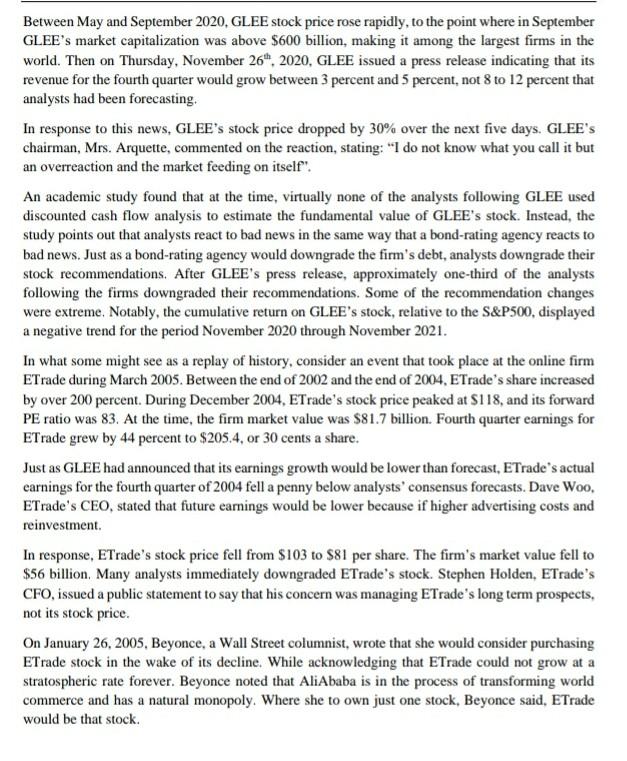Answered step by step
Verified Expert Solution
Question
1 Approved Answer
Discuss whether the analysts following the ETrade appear to have been influenced by any psychological phenomena, both generally and in their reaction to the companys
Discuss whether the analysts following the ETrade appear to have been influenced by any psychological phenomena, both generally and in their reaction to the companys announcement in September 2020. The answer should not exceed 100 words
Answer the question above based on this

thank you ...
Between May and September 2020. GLEE stock price rose rapidly, to the point where in September GLEE's market capitalization was above $600 billion, making it among the largest firms in the world. Then on Thursday, November 26, 2020, GLEE issued a press release indicating that its revenue for the fourth quarter would grow between 3 percent and 5 percent, not 8 to 12 percent that analysts had been forecasting, In response to this news, GLEE's stock price dropped by 30% over the next five days. GLEE's chairman, Mrs. Arquette, commented on the reaction, stating: "I do not know what you call it but an overreaction and the market feeding on itself". An academic study found that at the time, virtually none of the analysts following GLEE used discounted cash flow analysis to estimate the fundamental value of GLEE's stock. Instead, the study points out that analysts react to bad news in the same way that a bond-rating agency reacts to bad news. Just as a bond-rating agency would downgrade the firm's debt, analysts downgrade their stock recommendations. After GLEE's press release, approximately one-third of the analysts following the firms downgraded their recommendations. Some of the recommendation changes were extreme. Notably, the cumulative return on GLEE's stock, relative to the S&P500, displayed a negative trend for the period November 2020 through November 2021. In what some might see as a replay of history, consider an event that took place at the online firm ETrade during March 2005. Between the end of 2002 and the end of 2004. ETrade's share increased by over 200 percent. During December 2004, ETrade's stock price peaked at $118, and its forward PE ratio was 83. At the time, the firm market value was $81.7 billion. Fourth quarter earnings for ETrade grew by 44 percent to $205.4, or 30 cents a share. Just as GLEE had announced that its earnings growth would be lower than forecast, ETrade's actual earnings for the fourth quarter of 2004 fell a penny below analysts' consensus forecasts. Dave Woo, ETrade's CEO, stated that future earnings would be lower because if higher advertising costs and reinvestment. In response, ETrade's stock price fell from $103 to $81 per share. The firm's market value fell to $56 billion. Many analysts immediately downgraded ETrade's stock. Stephen Holden, ETrade's CFO, issued a public statement to say that his concern was managing ETrade's long term prospects, not its stock price. On January 26, 2005, Beyonce, a Wall Street columnist, wrote that she would consider purchasing ETrade stock in the wake of its decline. While acknowledging that ETrade could not grow at a stratospheric rate forever. Beyonce noted that AliAbaba is in the process of transforming world commerce and has a natural monopoly. Where she to own just one stock, Beyonce said, ETrade would be that stockStep by Step Solution
There are 3 Steps involved in it
Step: 1

Get Instant Access to Expert-Tailored Solutions
See step-by-step solutions with expert insights and AI powered tools for academic success
Step: 2

Step: 3

Ace Your Homework with AI
Get the answers you need in no time with our AI-driven, step-by-step assistance
Get Started


